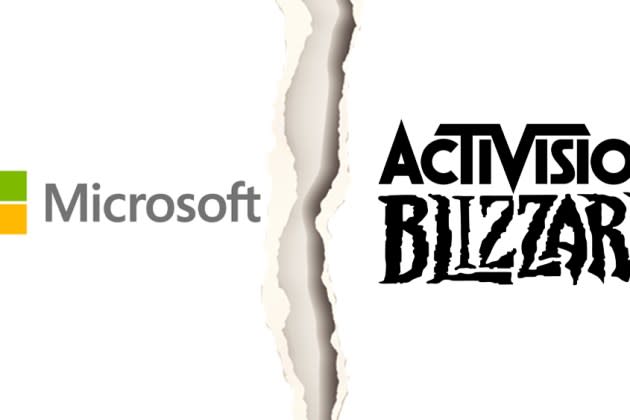Microsoft, Activision Blizzard Confident Merger Will Close As FTC Prepares To Challenge $69-Billion Deal In Court – Update
- Oops!Something went wrong.Please try again later.

Brad Smith, Microsoft’s vice chair and president, and Activision Blizzard CEO Bobby Kotick both said they’re confident their $69 billion merger will close, despite news that the antitrust-buster FTC plans to challenge it in court.
“This sounds alarming, so I want to reinforce my confidence that this deal will close,” Kotick said in a memo to employees. “The allegation that this deal is anti-competitive doesn’t align with the facts, and we believe we’ll win this challenge.”
More from Deadline
Elon Musk Tells Twitter Employees, "Bankruptcy Is Not Out Of The Question"
Sale Of Microsoft Co-Founder Paul Allen's Collection Set To Be Largest Art Auction In History
Netflix Ad-Supported Tier Will Have Better Economics Than Ad-Free One, COO Greg Peters Says
Smith said Microsoft has “been committed since Day One to addressing competitive concerns, including by offering earlier this week proposed concessions to the FTC. While we believed in giving peace a chance, we have complete confidence in our case and welcome the opportunity to present our case in court.”
Kotick’s memo:
Team,
I wanted to provide a brief update on our pending merger with Microsoft. This week the U.S. Federal Trade Commission (FTC) announced its decision to challenge the deal. This means they will file a lawsuit to block the merger, and arguments will be heard by a judge.
This sounds alarming, so I want to reinforce my confidence that this deal will close. The allegation that this deal is anti-competitive doesn’t align with the facts, and we believe we’ll win this challenge.
Thanks to the hard work by all of you every day, we’re on a strong path, bringing epic joy to players around the world with what I believe are the greatest games in the industry. At the same time, the competitive landscape is shifting, and, simply put, a combined Microsoft-ABK will be good for players, good for employees, good for competition and good for the industry. Our players want choice, and this gives them exactly that. You can read more about the specifics on those points in this update we recently shared with you.
We believe these arguments will win despite a regulatory environment focused on ideology and misconceptions about the tech industry.
Thank you for your dedication and creativity.
Bobby
PREVIOUSLY: An increasingly aggressive Federal Trade Commission will sue to block a proposed $69 billion merger between Microsoft and leading video game developer Activision Blizzard announced early this year. It said the deal would hand the tech giant and Xbox maker too much control of top videogame franchises, “enabling it to harm competition in high-performance gaming consoles and subscription services by denying or degrading rivals’ access to its popular content.”
The acquisition of the company behind Call of Duty — which would be Microsoft’s largest ever deal as well as the biggest ever in the video gaming industry — “would enable Microsoft to suppress competitors to its Xbox gaming consoles and its rapidly growing subscription content and cloud-gaming business,” the FTC said in its complaint issued Thursday.
The agency, newly emboldened under chair Lina Khan and with an expanded vision of its antitrust mandate, has become increasingly front of mind as companies consider deals. It recently, and successfully, sued to block Paramount Global’s $2.2 billion sale of Simon & Schuster to Penguin Random House. The coming lawsuit will be one of the biggest tests of FTC’s ability to check the power of big tech. It did not sue to block Amazon’s acquisition of MGM.
Today the agency pointed to Microsoft’s “record of acquiring and using valuable gaming content to suppress competition from rival consoles,” including in its acquisition of ZeniMax, parent company of Bethesda Softworks. Microsoft made several Bethesda’s titles including Starfield and Redfall Microsoft exclusives despite assuring European antitrust authorities that it had no incentive to withhold games from rival consoles, the FTC said.
“Microsoft has already shown that it can and will withhold content from its gaming rivals,” said Holly Vedova, Director of the FTC’s Bureau of Competition. “Today we seek to stop Microsoft from gaining control over a leading independent game studio and using it to harm competition in multiple dynamic and fast-growing gaming markets.”
The rest of the FTC’s announcement:
Microsoft’s Xbox Series S and Series X are one of only two types of high performance video game consoles. Importantly, Microsoft also offers a leading video game content subscription service called Xbox Game Pass, as well as a cutting-edge cloud-based video game streaming service, according to the complaint.”
Activision is one of only a very small number of top video game developers in the world that create and publish high-quality video games for multiple devices, including video game consoles, PCs, and mobile devices. It produces some of the most iconic and popular video game titles, including Call of Duty, World of Warcraft, Diablo, and Overwatch, and has a combined 154 million monthly active users around the world, according to the FTC’s complaint. Activision currently has a strategy of offering its games on many devices regardless of producer.
But that could change if the deal is allowed to proceed. With control over Activision’s blockbuster franchises, Microsoft would have both the means and motive to harm competition by manipulating Activision’s pricing, degrading Activision’s game quality or player experience on rival consoles and gaming services, changing the terms and timing of access to Activision’s content, or withholding content from competitors entirely, resulting in harm to consumers.
The Commission vote to issue the complaint was 3-1, with Commissioner Christine S. Wilson voting no.
Best of Deadline
Sign up for Deadline's Newsletter. For the latest news, follow us on Facebook, Twitter, and Instagram.

